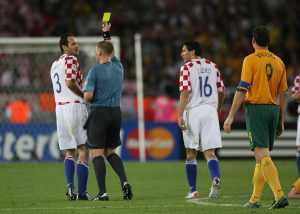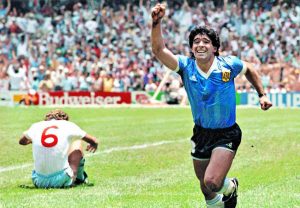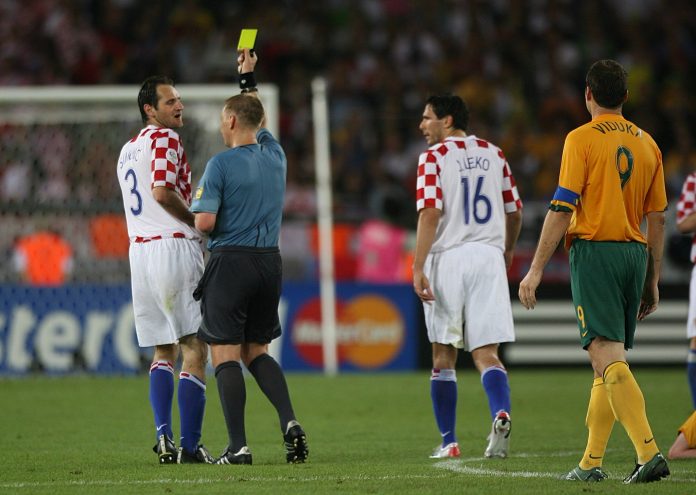In the late stages of an outright battle for second place in Group F at the 2006 World Cup in Germany, referee Graham Poll brandished a yellow card to Croatian player, Josip Simunic. Players stood around expecting the inevitable, as this was Simunic’s second yellow card of the game. The first having been issued some 30 or so minutes before then. But contrary to common sense and FIFA rules, Poll simply got on with the game, to the bewilderment if both sets of players. So bewildered by this call (and a few other unusual calls on the night by Poll) was Simunic that at the final whistle a mere 3 minutes later, he confronted Poll, pushing the referee and earning himself an incredible 3rd yellow card before finally being shown the red card.
In one of the poorest refereed matches which saw 2 clear penalties not awarded for Australia before they themselves benefited from the shenanigans as Harry Kewell scored while in an offside position to secure 2nd spot for the Socceroos before being denied a would be would be winner with the last kick of the game as the referee made a mess of getting his whistle to his mouth thus erroneously allowing the match to continue for a few seconds which allowed Australia get the back in the back of the net in the first place, Graham Poll wrote his name in the World Cup book of infamy among some other blundering referees of the World Cup.

His, of course, has been neither the only nor the worst refereeing faux pas in World Cup history. The global Mundial, like any other sporting competition, has had its fair share of refereeing controversies over the years. Take, for example, England’s one and only World Cup win which still has whisperings of referee favouritism surrounding it. A contentious sending off of Argentine Captain and talisman Antonio Rattin for apparently using ‘language’ that the referee deemed offensive. The catch? German referee Rudolf Kreitlein did not speak a lick of Spanish and Rattin couldn’t construct a sentence in German to save his life, or as it turned out his countries World Cup campaign. Despite pleas for a translator, Rattin was ushered off the pitch and Geoff Hurst scored the winner in the second half. After the match, referee Kreitlein insisted the sending off was justified as he didn’t like the look on the face of Rattin as he confronted him over calls during the game.

Hurst again played some part in controversy in the final as it was his goal which cannoned off the underside of the post and bounced off the goal line but was incorrectly judged to have crossed the line, giving England a 3-2 lead in the final.
England themselves would be on the wrong end of dodgy calls in events that would surely make a compilation of Karma’s greatest hit. The first came against Argentina in the 1986 World Cup Quarterfinal. England would have been forgiven for thinking their luck was still flowing in the right direction as the referee continued to turn a blind eye to England’s atrocious attempts at stopping Maradona and co, but they were dealt a sucker punch as Maradona met a failed clearance in the air, clearly using his fist to turn the ball past goalkeeper Peter Shilton. It was clear to everybody except referee Ali Bin Nasser who saw no qualms with the attempt on goal and allowed the goal to stand. There was nothing fortuitous about Maradona’s second goal which knocked them out though, but England will always rue the moment when Bin Nasser failed to see the clear handball.

Karma took it up a notch when England played Germany in the round of 16 in the 2010 World Cup. With Germany leading 2-1, Frank Lampard struck an effort reminiscent of Hurst’s effort against Germany in 1966 except that this time the ball definitely crossed the line. It wouldn’t count though as referee Jorge Larrionda decided he hadn’t seen the ball cross the line. England went on to lose 4-1 with 2 further goals from Thomas Muller.
Spain didn’t ever have any of England’s good luck but they have had to endure an even worse time at the hands of referees than England did. Their first major run-in with bad luck came in the 1962 World Cup when they were 1-0 up in the group stage against Brazil and had a perfectly good goal from Aderlado was ruled out for no discernible reason. Brazil went on to win on that occasion as they also did in 1986, another perfectly viable goal from Spain was dubiously ruled out before Socrates scored a winning goal from an offside position. The conspiracy-like affront on the Spanish continued in the 1994 quarterfinal in the USA as Italy’s Mauro Tassotti escaped giving away a penalty after a shocking elbow on Luís Enrique in the box was overlooked by referee Sándor Puhl from Hungary. As if Spain hadn’t suffered enough, their disgraceful exit from the World Cup co-hosted by Japan and Korea at the hands of hosts Korea was one of the worst refereed matches in World Cup history. Spain were knocked out on penalties after having not one but 2 legitimate goals ruled out. All this must have made their 2010 victory against the odds even sweeter.

Spain weren’t the only countries to suffer at the hands of careless refereeing against Korea as Portugal in the group phase and Italy in the second round had unusual calls go against them. Italy especially had their best player, Francesco Totti sent off for a dive in extra time despite making obvious contact with a Korean defender in the box. Italy got lucky themselves in their run to the 2006 World title. In their round of 16 tie against Australia, Totti converting a penalty won in extra time when Fábio Grosso theatrically fell over Australian defender Lucas Neil who was already on the floor.
Korea aren’t the only host country to get apparent preferential treatment as Brazil also had some ‘good luck’ in their 2014 World Cup campaign before being annihilated in the semifinal by eventual winners Germany. In the group stage game against Croatia, Neymar escaped being sent off after appearing to elbow Luka Modric in the face, only being reprimanded by a yellow card. He was on hand to score from Fred’s dubiously won penalty as well as Brazil opened their World Cup campaign with a win. Neymar became a victim of Brazil’s good fortune in the quarterfinal after his team was let off the hook for several brazen fouls while trying to stifle Colombia’s, James Rodriguez. As the referee lost control of the game leading to Bedlam on the pitch, Neymar got a stern knee in the back which ended his World Cup and ruled him out of action for several months.

With the introduction of VAR system for the 2018 World Cup, we can only hope that such incidents are kept to the barest minimum
Article By: Ayoola Kelechi








